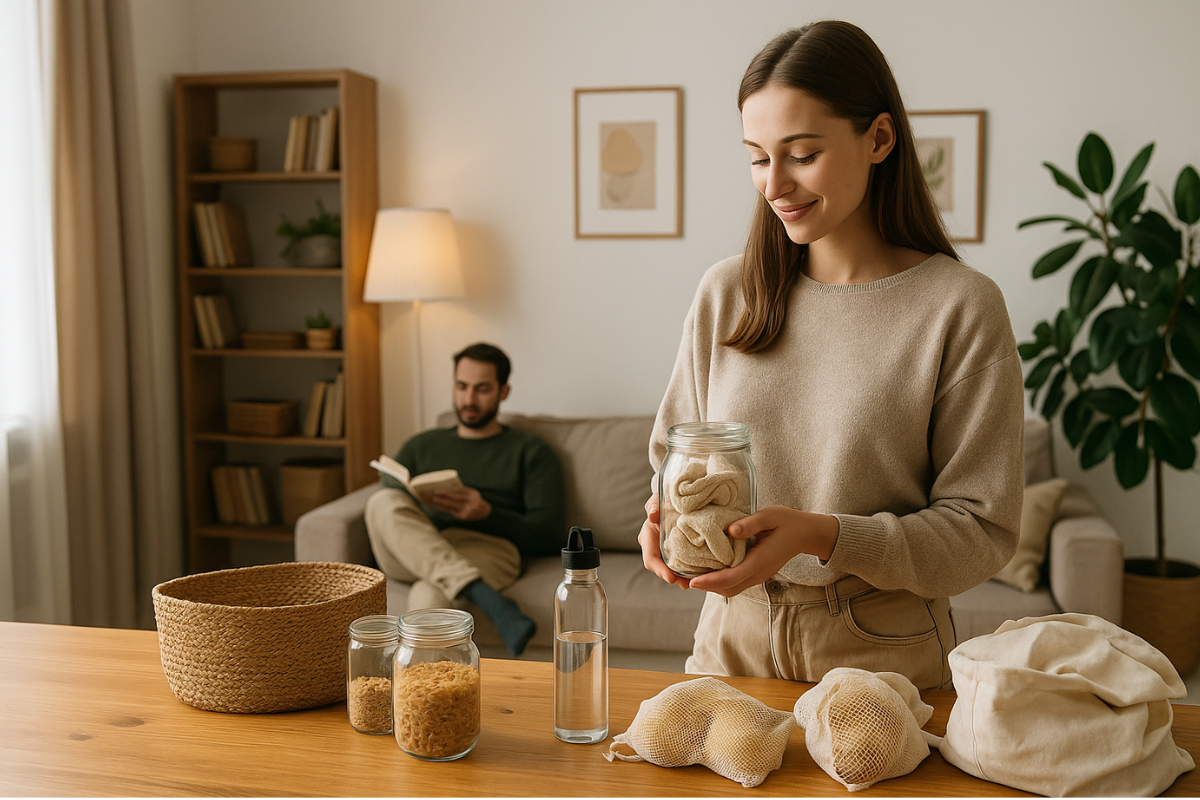Living a sustainable life is often associated with costly choices or dramatic changes. But in reality, it’s about making intentional, consistent decisions that reduce harm to the environment without overburdening your budget. From the way we shop to how we manage waste at home, sustainability can be integrated into our everyday routines with ease—and often, with savings.
What Daily Sustainability Actually Means
Sustainability in daily life refers to conscious actions that help preserve natural resources and minimize waste. It doesn’t require perfection but progress. Every small action adds up, whether it’s choosing a reusable coffee cup or avoiding unnecessary purchases.
The Core Principles:
- Reduce: Buy and use less
- Reuse: Repurpose before discarding
- Recycle: Separate waste responsibly
- Refuse: Say no to what you don’t need
- Rethink: Question your consumption habits
Start With What You Already Have
Before buying eco-friendly replacements, assess what’s already available in your home. The most sustainable product is the one you don’t need to buy. Use old jars for food storage, repurpose towels as cleaning rags, and give new life to clothes before replacing them.
Examples:
- Turn glass jars into pantry containers
- Use old t-shirts as reusable cleaning cloths
- Mend damaged clothes instead of tossing them
Build Smart Shopping Habits
Choose Quality Over Quantity
Buying fewer, higher-quality items that last longer reduces both waste and the need for frequent replacements. Avoid impulse buying and aim to shop with intention.
Shop Second-Hand
Thrift stores, clothing swaps, and online marketplaces are rich with affordable, pre-loved items. Buying second-hand significantly cuts down the resources needed to produce new goods.
Support Local and Ethical Brands
When you do buy new, look for businesses that prioritize sustainability, fair wages, and responsible packaging.
Make Reusables Part of Your Routine
Single-use items create mountains of waste. Swapping them out for reusable alternatives is one of the most affordable and effective changes you can make.
Key Swaps to Try:
- Water bottles: Use stainless steel or glass options
- Shopping bags: Bring cloth or foldable bags
- Coffee cups: Carry a travel mug
- Utensils: Keep a bamboo set in your bag
- Food storage: Use beeswax wraps or glass containers
Over time, these reusables pay for themselves and drastically reduce plastic consumption.
Cook More, Waste Less
Cooking at home reduces packaging waste and allows better control over ingredients and portion sizes.
Easy Sustainability Tips in the Kitchen:
- Plan meals to avoid food spoilage
- Store produce properly to extend shelf life
- Use peels and stems to make broth or compost
- Freeze leftovers for quick meals
Embrace DIY and Natural Products
Make Your Own Cleaners
Basic pantry items like vinegar, baking soda, and lemon juice can clean just as effectively as commercial products—without harmful chemicals or packaging.
Simple All-Purpose Cleaner Recipe:
- 1 part white vinegar
- 1 part water
- A few drops of essential oil (optional)
Store in a spray bottle and use on countertops, windows, and more.
DIY Personal Care
Try homemade toothpaste, deodorant, or body scrubs. There are endless affordable and natural recipes available online.
Reduce Energy Use (and Lower Your Bills)
You don’t need solar panels to live more sustainably at home. Small behavioral changes can make a big difference.
Practical Steps:
- Turn off lights when not in use
- Use energy-efficient bulbs
- Unplug devices or use a smart power strip
- Wash clothes in cold water and air dry when possible
Each of these reduces your household carbon footprint while saving on utility costs.
Save Water with Simple Changes
Water conservation isn’t just good for the planet—it’s often necessary in drought-prone areas.
Everyday Habits to Adopt:
- Fix dripping faucets
- Install low-flow showerheads
- Turn off the tap while brushing teeth
- Reuse greywater for plants (e.g., from rinsing produce)
Travel Consciously
Even your commute and vacation plans can become more sustainable.
Sustainable Travel Habits:
- Walk, bike, or take public transport whenever possible
- Carpool with friends or coworkers
- Avoid air travel when a train or bus is an option
- Stay in eco-conscious accommodations when traveling
Involve Others and Spread Awareness
Leading by example often inspires those around you. Talk to friends, share tips, and even start group challenges—like zero-waste weeks or swap events.
Progress Over Perfection
Sustainable living is not an all-or-nothing pursuit. The key is to begin with manageable steps that align with your lifestyle and grow from there.
If You’re Just Starting Out, Begin With:
- One reusable swap (like a water bottle)
- One habit change (like reducing food waste)
- One DIY experiment (like homemade cleaner)
Living Well With Less
Being sustainable isn’t about depriving yourself—it’s about living with more intention, clarity, and connection to the world around you. When you shift your habits, you also shift your perspective. Life becomes less cluttered, more mindful, and more fulfilling. And often, more affordable.
By choosing sustainability, you’re choosing a better future—not just for the planet, but for yourself and the generations to come.
